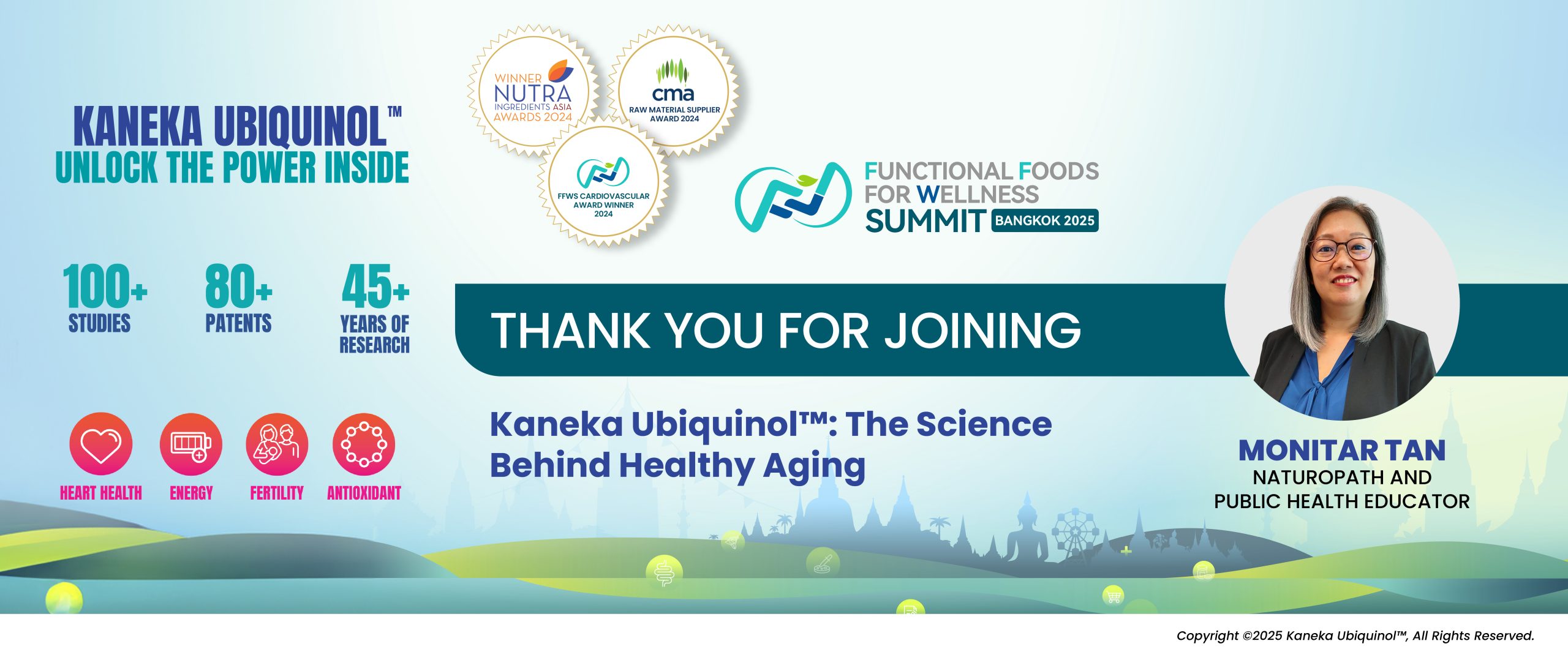
Four Simple Ways To Support Fertility
Apr 2021Recent Article
For men and women looking to start or grow their family, helping support healthy fertility is essential. Fertility issues can affect up to 1 in 6 Australian couples of reproductive age[1]. Luckily, there are a few natural ways to help support your fertility, including nutrition and lifestyle choices.
Eat Foods Rich in Antioxidants
Foods rich in antioxidants may help support healthy fertility in both men and women. Antioxidants deactivate the free radicals in your body[2]. Free radicals may cause oxidative stress, which in turn may damage both sperm and egg cells[3].
Foods such as fruits, vegetables, nuts and grains are packed full of beneficial antioxidants like vitamins C and E, folate, beta carotene, and lutein. Eating more of these healthy foods may help support your efforts to conceive2.
Supplement with Ubiquinol
Ubiquinol, the active form of CoQ10, is a fat-soluble antioxidant found naturally in the body that supports cardiovascular health, cellular energy production and healthy male fertility[4]. Ubiquinol, as an antioxidant, may help to relieve the effects of free radicals that disrupt healthy cells4. Ubiquinol also plays a role in supporting the synthesis of ATP in the mitochondria of the cell, helping support sperm cells with the energy it needs to function[5].
After age 30, the body’s natural levels of Ubiquinol begin to decrease[6]. Ubiquinol is found naturally in foods, such as steak, peanuts, sardines, spinach, avocado, chicken and olive oil[7].
However, trying to replenish the body’s natural levels of Ubiquinol through food alone could lead to consuming excessive amounts of these foods. For example to reach 100mg of Ubiquinol from food sources alone you would need to eat per day 10kg of broccoli, 20 steaks, 1.5kg of peanuts, 120 cans of sardines, 50 cups of spinach, 60 avocados, 100 table spoons of canola oil, 34 chicken breasts or 133 table spoons of olive oil. If you are interested in supporting your fertility with Ubiquinol, you may want to consider speaking to your healthcare practitioner about supplementing with Ubiquinol.
Exercise Regularly
Regular exercise has many health benefits, including supporting healthy fertility for both men and women[8]. However, moderation is key. Excessive physical exertion may lead to oxidative stress and may negatively affect your fertility3. If you plan to increase your physical activity, add it gradually and consult your healthcare practitioner for advice on what type of exercise is right for your body.
Get Sufficient Rest
If you and your partner are trying to conceive, it is essential that you both get sufficient rest. As your stress levels increase, your chances of getting pregnant may start to decrease[9]. This may be due to the hormonal changes that occur within the body when you feel stressed9. Getting adequate rest and a full 7 to 8 hours of sleep each night can help lower stress levels and support healthy fertility. You may also wish to consult your healthcare practitioner about supplementing with Ubiquinol to relieve the effects of long-term oxidative stress.
Before taking a ubiquinol supplement seek medical advice from a doctor or consult your healthcare practitioner to find out whether a supplement is right for you. Always read the label.
[1] IVF Australia (2021) Planning for pregnancy What is infertility?, IVF Australia. Accessed 19/04/2021 https://www.ivf.com.au/planning-for-pregnancy/what-is-infertility#:~:text=It%20affects%20about%201%20in,or%20a%20combination%20of%20factors.
[2] Smits, R.M., Mackenzie-Proctor, R., Fleischer, K. and Showell, M.G., 2018. Antioxidants in fertility: Impact on male and female reproductive outcomes. Fertility and sterility, 110(4), pp.578-580.
[3] Pizzino, G., Irrera, N., Cucinotta, M., Pallio, G., Mannino, F., & Arcoraci, V. et al. (2017). Oxidative Stress: Harms and Benefits for Human Health. Oxidative Medicine And Cellular Longevity, 2017, 1-13. doi: 10.1155/2017/8416763.
[4] Saini, R. (2011). Coenzyme Q10: The essential nutrient. J Pharm Bioallied Sci, 3(3), 466-467. http://www.peirsoncenter.com/uploads/6/0/5/5/6055321/coenzyme_q10__the_essential_nutrient.pdf
[5] Yu, J., Chen, B., Zheng, B., Qiao, C., Chen, X., Yan, Y., Luan, X., Xie, B., Liu, J., Shen, C. and He, Z., 2019. ATP synthase is required for male fertility and germ cell maturation in Drosophila testes. Molecular medicine reports, 19(3), pp.1561-1570. < https://www.spandidos-publications.com/mmr/19/3/1561>
[6] Linnane, A. W., Zhang, C., Yarovaya, N., Kopsidas, G., Kovalenko, S., Papakostopoulos, P., … & Richardson, M. (2002). Human aging and global function of coenzyme Q10. Annals of the New York Academy of Sciences, 959(1), 396-411. https://nyaspubs.onlinelibrary.wiley.com/doi/full/10.1111/j.1749-6632.2002.tb02110.x
[7] Kubo, H., Fujii, K., Kawabe, T., Matsumoto, S., Kishida, H. and Hosoe, K., 2008. Food content of ubiquinol-10 and ubiquinone-10 in the Japanese diet. Journal of Food Composition and Analysis, 21(3), pp.199-210.
[8] Olive, D.L., 2010. Exercise and fertility: an update. Current Opinion in Obstetrics and Gynecology, 22(4), pp.259-263.
[9] Rooney, K.L. and Domar, A.D., 2016. The impact of stress on fertility treatment. Current Opinion in Obstetrics and Gynecology, 28(3), pp.198-201.
You can share this by:
Keep up-to-date with Ubiquinol News
Ubiquinol Headlines
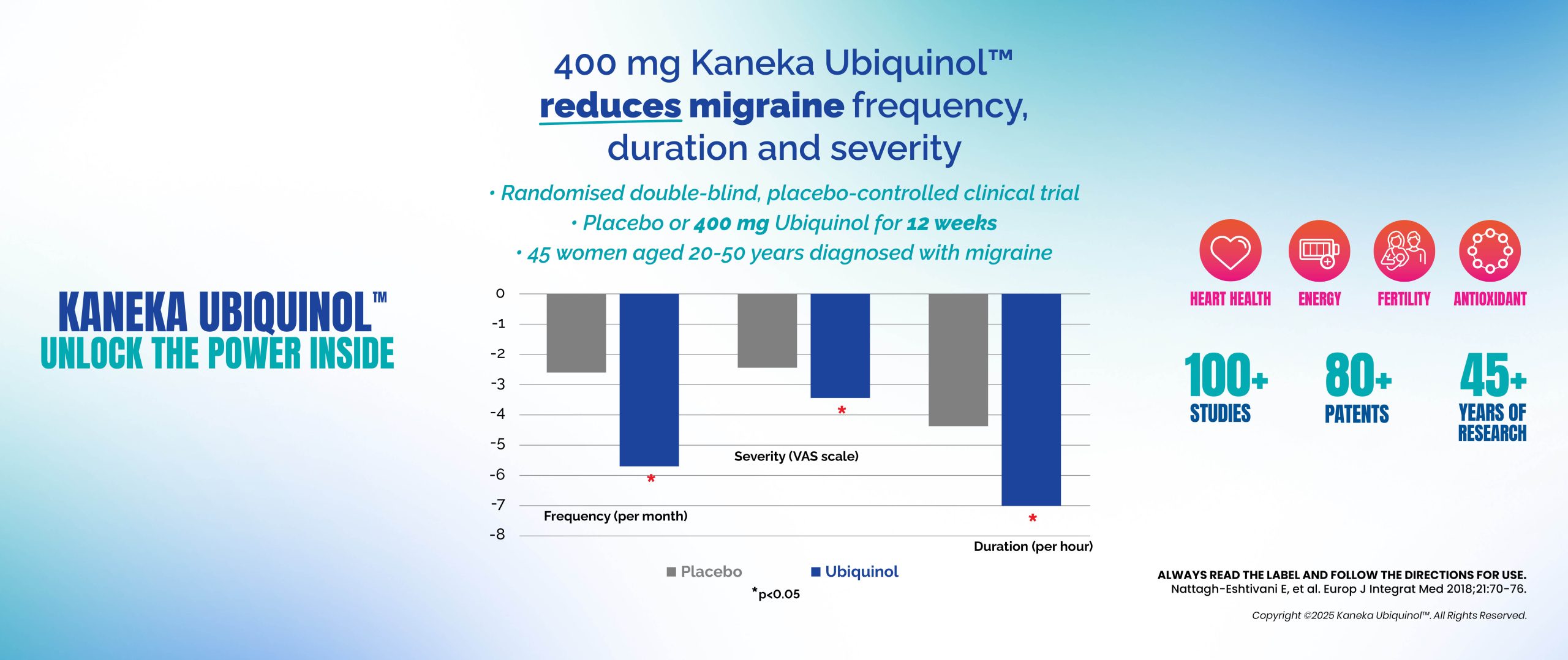
Ubiquinol: Supporting Migraine Relief Through Cellular Energy
Jan 2025Category: Antioxidants, complementary medicine, Energy, Fatigue, Health, Health Industry, healthy ageing, Kaneka, Mitochondrial health, Nutrition, Stress, Ubiquinol, Vitamins, wellnessRead More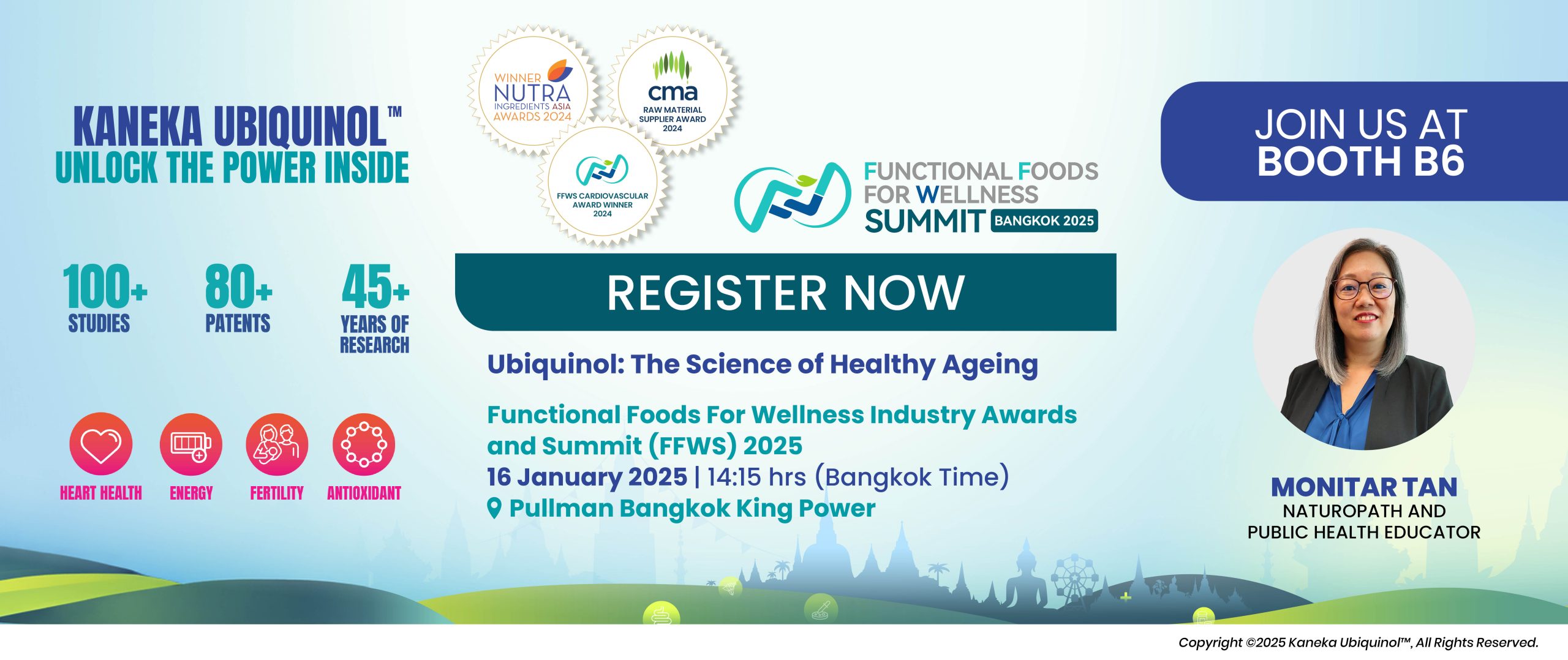
Kaneka Ubiquinol™ at Functional Foods for Wellness Industry Awards and Summit, #FFWS2025
Jan 2025Category: Ageing, Antioxidants, Awards, cardiovascular health, Conference, Conferences, Energy, Fatigue, FFWS2025, Health, Health Industry, healthy ageing, Kaneka, Menopause, Mitochondrial health, Nutrition, Ubiquinol, VitaminsRead More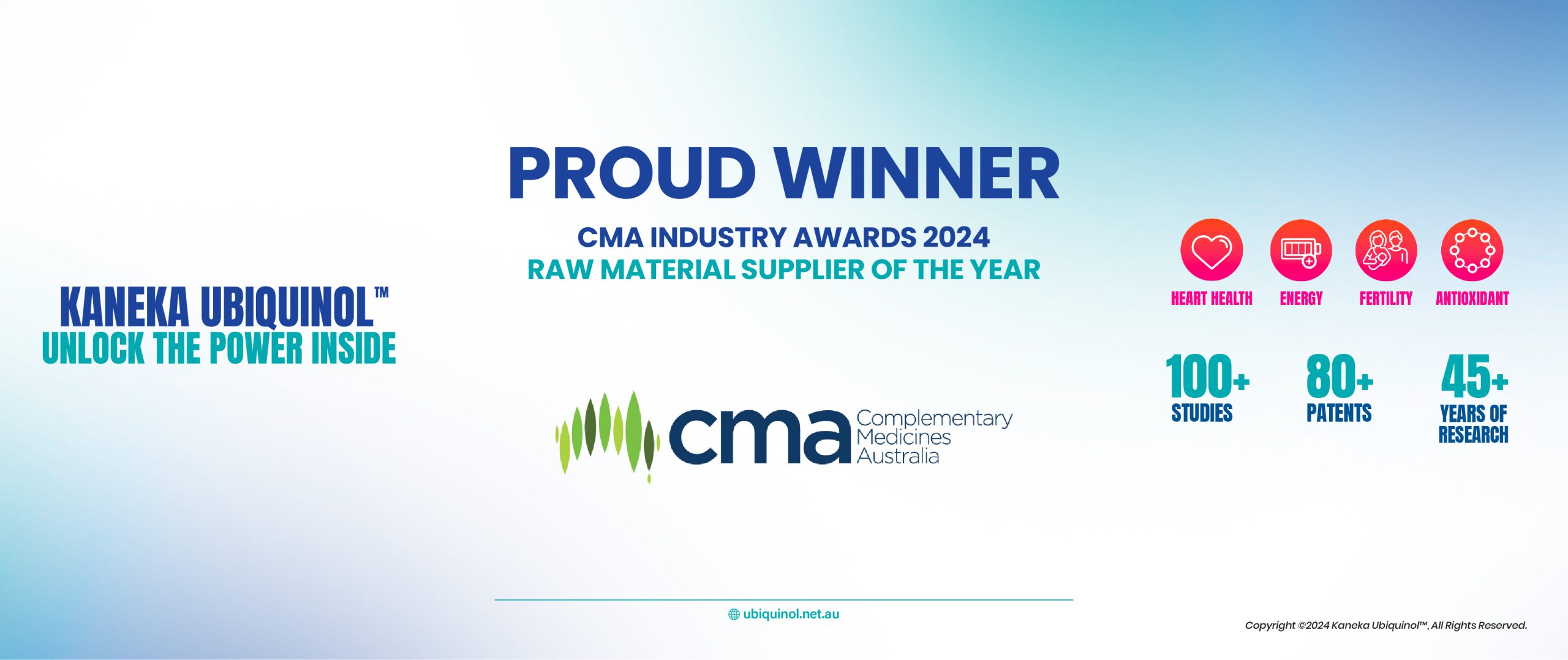
Kaneka Ubiquinol Wins Prestigious Complementary Medicines Raw Material Supplier of the Year Award 2024
Dec 2024Category: Ageing, Awards, cardiovascular health, complementary medicine, Conference, Conferences, Endurance, Energy, Fatigue, Fertility, Fitness, Health, Health Industry, healthy ageing, Heart, Immunity, In The News, Kaneka, Lungs, Memory, Mitochondrial health, Nutrition, Online, Stress, Ubiquinol, Vitamins, wellnessRead More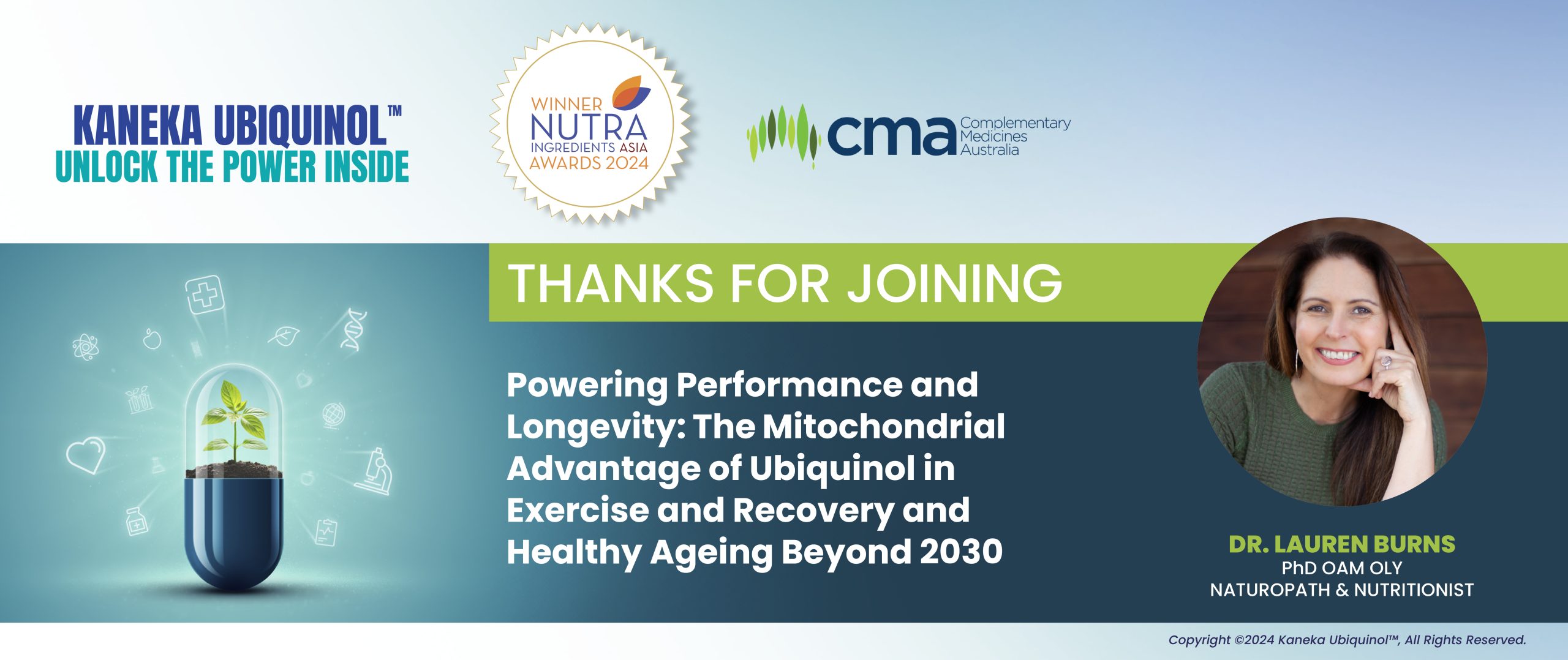
“Powering Performance and Longevity: Kaneka Ubiquinol™ at the CMA Annual Conference 2024”
Nov 2024Category: Ageing, Antioxidants, Awards, cardiovascular health, chronic fatigue syndrome, complementary medicine, Conference, Conferences, Endurance, Energy, Fatigue, Fertility, Fitness, Health, Health Industry, healthy ageing, Heart, In The News, Kaneka, Mitochondrial health, Online, Ubiquinol, VitaminsRead More
Natural Health Product Innovation Expo 2024
Nov 2024Category: Ageing, Antioxidants, cardiovascular health, Cholesterol, chronic fatigue syndrome, Conference, Conferences, Endurance, Energy, Fatigue, Fertility, Fitness, Health, Health Industry, healthy ageing, Heart, Kaneka, Menopause, Mitochondrial health, NHNZ, Nutrition, Stress, Ubiquinol, Vitamins, wellnessRead More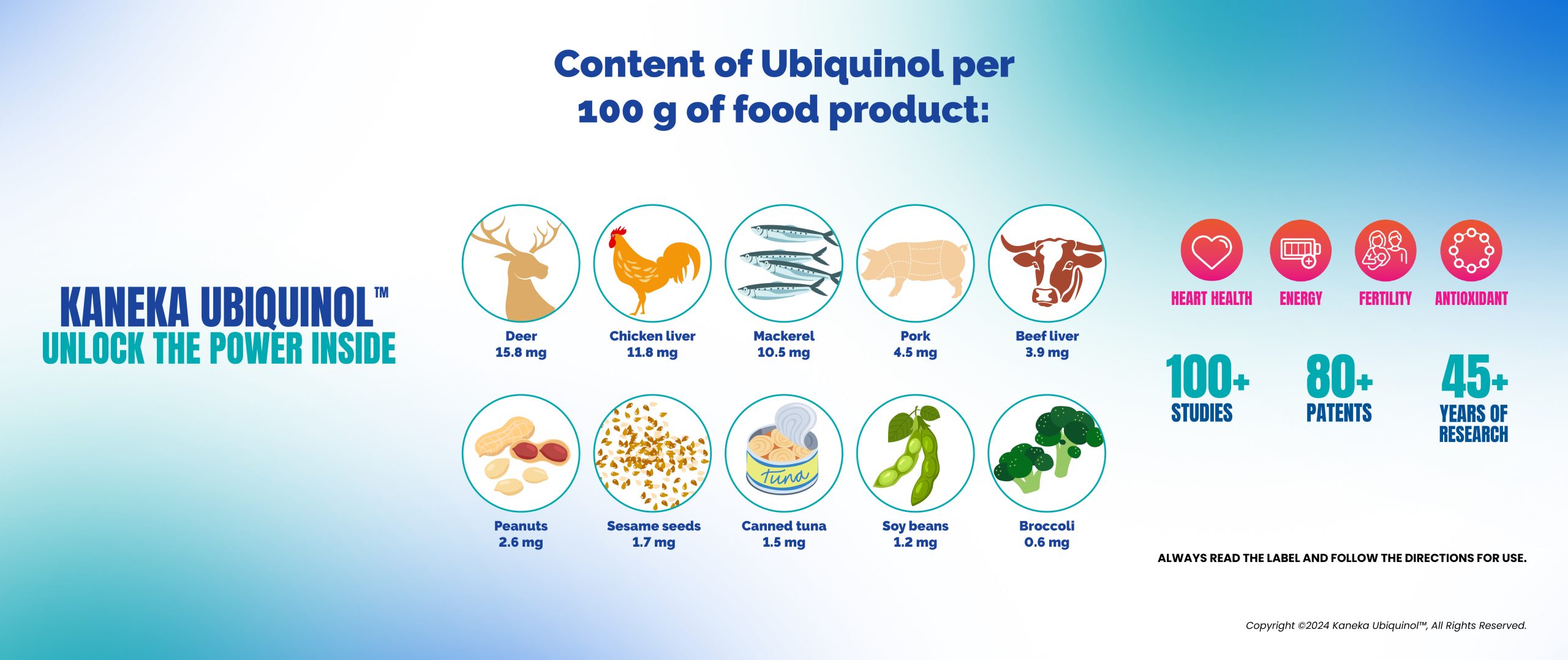
Ubiquinol: The Overlooked Nutrient for Vegans and Vegetarians
Oct 2024Category: Ageing, Antioxidants, Cholesterol, complementary medicine, Endurance, Energy, Fatigue, Fitness, Health, Health Industry, healthy ageing, Heart, Mitochondrial health, Nutrition, Stress, Ubiquinol, vitafoods, Vitamins, wellnessRead More
Investigating the Application of Ubiquinol in Mitochondrial Function
Oct 2024Category: Ageing, Antioxidants, cardiovascular health, Cholesterol, chronic fatigue syndrome, Endurance, Energy, Fatigue, Fertility, Fitness, Flu, Health, Health Industry, healthy ageing, Heart, Immunity, In The News, Kaneka, long covid, Lungs, Memory, Menopause, Mitochondrial health, myalgic encephalomyelitis, Nutrition, post pandemic, Stress, Ubiquinol, Vitamins, wellnessRead More


